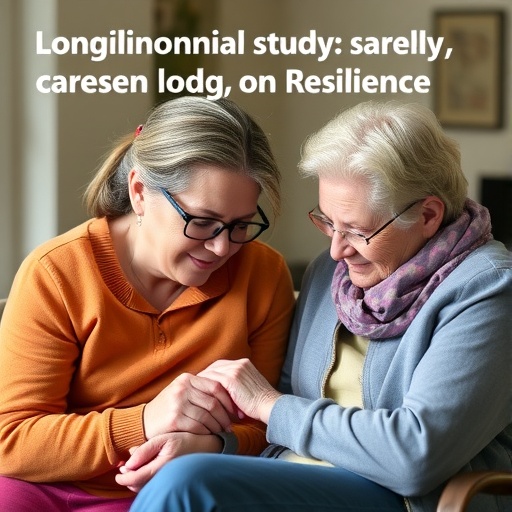In a groundbreaking longitudinal study, researchers have delved into the complexities of caregiver burden, particularly focusing on those who provide primary support to patients suffering from colorectal cancer. This population is often overlooked despite the significant emotional and physical demands placed on them during the cancer journey. Understanding the dynamics of caregiver burden is vital, especially as the number of cancer patients continues to rise globally, creating an urgent need for supportive measures.
Caregiving, particularly in the context of chronic illness such as cancer, comes with its unique challenges. Caregivers often experience a spectrum of emotions, including stress, anxiety, and even depression. As the primary source of support for patients, caregivers must navigate their loved ones’ health issues, which can be mentally and physically draining. The study conducted by Xia et al. aims to shed light on this often-hidden struggle and identify factors that influence caregiver resilience.
A core component of the research is the concept of “sense of coherence” (SoC), which refers to an individual’s capacity to perceive life as manageable, meaningful, and comprehensible. The researchers posited that a strong sense of coherence among caregivers could buffer against the adverse effects of burden. This psychological construct has been extensively studied in various health contexts, suggesting that individuals with high SoC may be better equipped to handle stressors associated with caregiving.
The longitudinal nature of the study adds depth to the findings, allowing for the observation of trends and changes in caregiver burden over time. By monitoring caregivers at multiple points, the researchers could see how their emotional and psychological states evolved alongside their loved ones’ health trajectories. This methodological approach provides a richer understanding of the caregiving experience, illustrating how burden is not a static condition but one that fluctuates with circumstances and time.
Data were collected from a sample of primary caregivers of colorectal cancer patients, focusing on key variables such as caregiver burden, sense of coherence, and various demographic factors. The study utilized validated assessment tools to quantify these variables, ensuring that the findings are both reliable and applicable to broader populations. This rigorous approach strengthens the argument for the importance of targeted support systems for caregivers.
Preliminary findings indicate that caregivers with a strong sense of coherence tend to report lower levels of burden. This correlation suggests that interventions aimed at enhancing caregivers’ psychological resilience could play a crucial role in mitigating the stresses associated with caregiving. Such interventions might include training programs, support groups, and resources that encourage caregivers to develop a more coherent understanding of their roles.
Furthermore, the study highlights the importance of social support networks in fostering a positive sense of coherence among caregivers. Those who reported having a robust support system—whether through family, friends, or community resources—demonstrated greater resilience and lower levels of reported burden. This finding underscores the need for healthcare professionals to not only support the patient during treatment but also to ensure that caregivers are not left to navigate this journey alone.
As the study progresses, researchers aim to explore the long-term impacts of caregiver burden and the effectiveness of various intervention strategies. By understanding the trajectories of burden and coherence, healthcare providers can develop more comprehensive care plans that include both patients and caregivers. This holistic approach could lead to improved outcomes for both parties, ultimately enhancing the quality of life during and after cancer treatment.
The implications of this research extend beyond the immediate context of colorectal cancer. The lessons learned can be applicable to various chronic illnesses, where caregiving dynamics remain a critical component of the health care system. By addressing caregiver burden head-on, we can pave the way for a more supportive healthcare environment that recognizes and values the indispensable role of caregivers.
In conclusion, the study by Xia et al. serves as a clarion call to re-evaluate how we approach caregiver support in oncology and beyond. As caretakers navigate the complexities of helping their loved ones through illness, it is imperative to recognize that their well-being is equally important. Investing in caregivers’ mental health through fostering a sense of coherence and providing social support may be the key to creating a more balanced care paradigm. As the discourse around caregiver health continues to evolve, let us not forget those who give so much of themselves in service to others.
Understanding the integral role of psychological resilience in caregiving, especially with concepts like sense of coherence, can lead to innovative strategies in caregiving support. Moving forward, it is essential for healthcare systems to acknowledge and integrate these findings into practice. By doing so, we honor not just the battles of the patients but also those fighting alongside them—our caregivers.
Subject of Research: Caregiver burden and sense of coherence in primary caregivers of colorectal cancer patients.
Article Title: The trajectory of caregiver burden and the predictive role of sense of coherence among primary caregivers of colorectal cancer patients: a longitudinal study.
Article References:
Xia, W., Liu, T., Wu, M. et al. The trajectory of caregiver burden and the predictive role of sense of coherence among primary caregivers of colorectal cancer patients: a longitudinal study.
BMC Nurs 24, 1202 (2025). https://doi.org/10.1186/s12912-025-03807-1
Image Credits: AI Generated
DOI:
Keywords: Caregiver burden, colorectal cancer, sense of coherence, longitudinal study, psychological resilience, social support, healthcare innovation.





